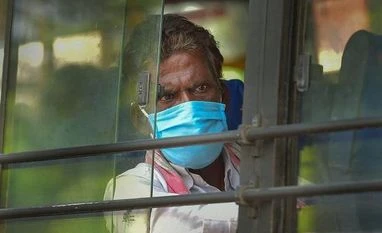There is an urgent need to streamline information on inter-state travel as data collected from various state portals revealed variation, said a group of researchers, professionals and civil society members representing stranded migrant workers.
The Ministry of Home Affairs (MHA) ordered a standard operating protocol on Monday, as train services resumed for passengers after nearly two months on Tuesday. However, the researchers pointed out, there is wide confusion among workers, despite the railways running Shramik Special trains to ferry them home since May 1.
In a letter to the MHA secretary on Monday, the researchers urged the government to create a common data portal for migrants to register their travel request.
The signatories to the letter were from the NGO, Stranded Workers’ Action Network (SWAN), covid-india.in (government order tracker), GramVaani (social tech firm), CoAST India (civil society initiative) and the Revitalising Rainfed Agriculture Network.
With regard to disparities, the letter gave examples such as migrants having to register twice — on the portal of the state they are travelling from as well as that of the destination state. On the other hand, some states have waived off double registration. For instance, Rajasthan has said it will not ask for registration for coming into the state unless the state of origin of travel specifically asks for a no-objection certificate.
Besides, portals for two critical states of Delhi and Bihar are not functional, while there is lack of clarity on post-registration processes.
In the absence of adequate information, a black market has spawned with migrants claiming to have paid between Rs 1,500 and Rs 8,000 to register for travelling by buses and trains.
Last week, SWAN and covid-india.in compiled all information from government orders in a portal (migrants.covid-india.in).
Anindita Adhikari, a researcher associated with SWAN, said the portal had gained traction among people trying to facilitate migrant travel. But, on the ground, there is absolute chaos and for several reasons, she added.
"There is a parallel offline process along with online registration. We have no way of knowing the rules for prioritisation, how passengers are assigned to trains, train schedules and how people are intimated."
The letter to the government also sought standardisation of offline and online registration as far as possible. It suggested the need for a system of announcements to relay information to the people concerned, and creation of multiple facilitation centres for this purpose. Besides, it recommended a web-based technology platform or app to log basic details of workers, and requested that registration should be based on the workers' choice to return home and not the will of the states.
SWAN, covid-india.in and the others have reached out to 46,000 migrant workers since March 27.
"In some cases, workers have paid over Rs 100,000 to arrange a bus and travel across states. In Delhi, in one case 54 people including three children who wanted to go to Jharkhand were trying to register online, but were unable to do so. Many workers from Uttar Pradesh have begun to cycle home from places like Ludhiana in Punjab because food was hard to get. In UP, workers we spoke to have faced issues with the portal but a few have been able to register. In West Bengal, there were particular problems as e-passes were only available for private vehicles. In the south zone, some migrants have been able to travel by registering online with the police sending them in batches," Adhikari said.
SWAN has surveyed migrant workers and released two reports earlier. Nearly 90 per cent out of the respondents hadn't been paid wages during the lockdown, whereas 96 per cent hadn't received dry rations, its first study showed in April.
More than four out of five persons hadn’t received rations, according to the second report earlier this month, while 41 per cent per cent said they would stay put because they were anxious about unpaid rent, loans and no cash to travel or even survive at home.
"Our second study showed marginal improvement in workers' access to relief, and also in payment by employers. But the crisis situation stands," said
Unlock 30+ premium stories daily hand-picked by our editors, across devices on browser and app.
Pick your 5 favourite companies, get a daily email with all news updates on them.
Full access to our intuitive epaper - clip, save, share articles from any device; newspaper archives from 2006.
Preferential invites to Business Standard events.
Curated newsletters on markets, personal finance, policy & politics, start-ups, technology, and more.
)